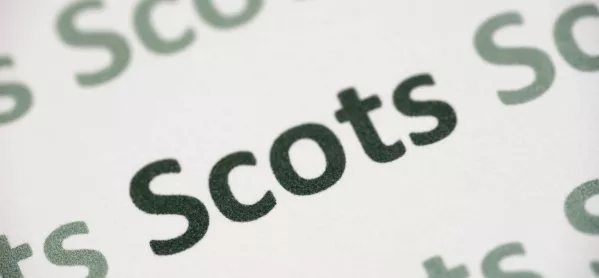The news that emerged last week that much of the content of Scots language‘s Wikipedia entries had been written by an American teen, with little or no knowledge of the language at all, has prompted much discussion across social media. It is a cautionary tale that we, as educators, should listen to and learn from.
The Scots version of Wikipedia was initially set up in 2005, as an opportunity to share and celebrate the language. It is, perhaps, understandable that the revelation that a substantial part of the content had been created by a non-Scots speaker who appeared to have little knowledge of the language caused consternation among many Scots speakers.
It quickly emerged that many of the entries on Scots Wikipedia were littered with inaccuracies and nonsensical vocabulary that bore little resemblance to the actual language. Concern was voiced that this added to the myth that Scots is nothing more than a regional dialect or sloppy English.
Opinion: ‘Scots language should be part of everyday teaching’
Long read: Why learning Scots is having a moment
Quick read: The importance of using Scots language in the classroom
With Scots being spoken by approximately 1.5 million people in this country (2011 census) and the language being taught in schools across the country, Scots Wikipedia had the opportunity to become an excellent and useful learning tool and point of referral that learners and long time Scots speakers could access and utilise. It is a platform that could have been used to celebrate and share this wonderful language with the rest of the world.
That a 19-year-old American non-Scots-speaking teenager, who started engaging with the site aged 12, was able to write tens of thousands of articles, seemingly unchecked, poses some very valid questions. Where were the Scots speakers ready to provide accurate contributions? Why is it only after many years down the road that this has come to light?
I am going to confess that before this story emerged I was not aware that Scots Wikipedia even existed. I suspect I am not alone. As Scots speakers rally round to amend and create accurate content for the site, perhaps this is the opportunity to make Scots Wikipedia the engaging and brilliant resource that it should be and has the potential to become?
However, beyond the discussion around Scots, this story has given us plenty to reflect upon. It is perhaps time to remind ourselves of the importance of demonstrating grace, empathy and kindness. It was sad to see the level of negativity shown to this young man from some quarters. What I saw was a teenager displaying values that we should be instilling in our young people. Yes, he may have got it wrong, but passion, inquisitiveness, perseverance and hard work are surely traits we want to celebrate and promote. We should be encouraging young people to put themselves out there and to not be afraid of getting in wrong. By shaming young people who don’t get it quite right, what sort of message are we sending out?
It also demonstrated how we need to continue to develop and teach an analytical approach when viewing sources, particularly online. Wikipedia, like many other online platforms, has to be viewed critically. This is a skill that we, as adults, must adopt and teach. We must educate our pupils not to trust everything they read. They must feel free to continually question the information that they are fed. We need to lead by example and teach our children to be critical thinkers when searching for information.
This wee tale has taught us a lot. I don’t believe that this boy’s actions have caused the Scots language any harm. If anything, it has given a level of publicity to Scots that was not there before and, with a group of Scots speakers actively working on the Wikipedia site, it will hopefully become the resource and source of information that it always should have been. Beyond that, it serves as a reminder that we need to display and teach caution when accessing unverified sources.
My final thought, though, is we must remember to be compassionate to others. I hope this teenager is not disheartened and will continue to engage with the beautiful Scots language. Let’s build our young people up, wherever they are from. Educate, celebrate and be kind. Always.
Kirsty Crommie is a primary teacher and children’s book blogger in Scotland. She tweets @KCrommie





